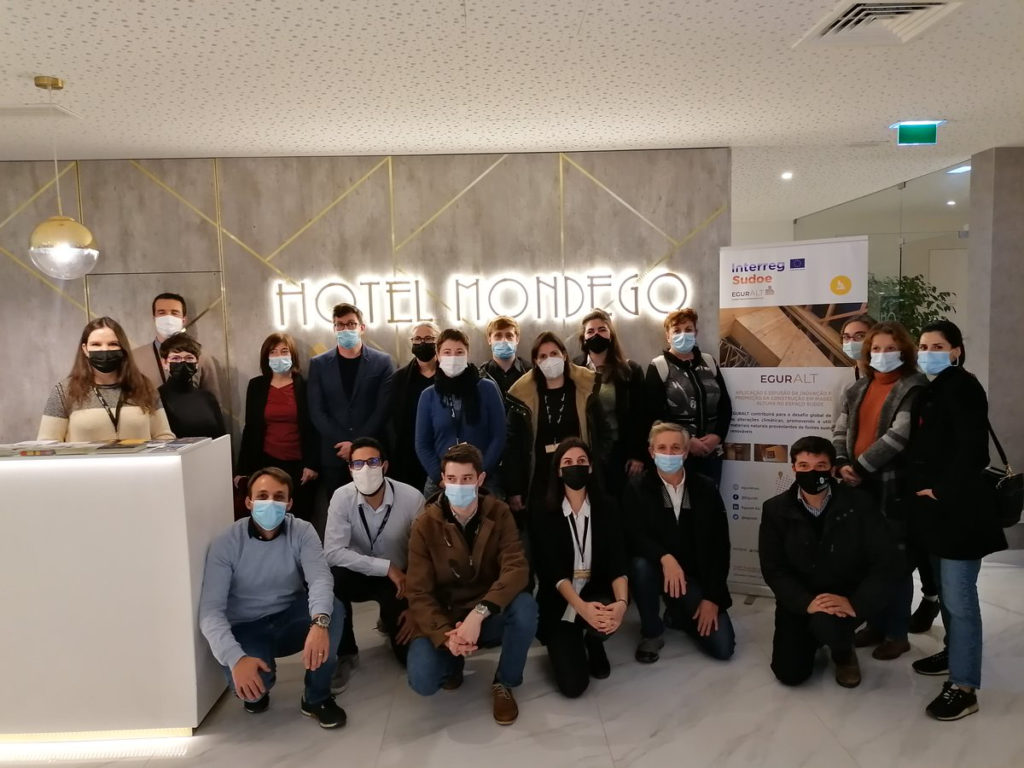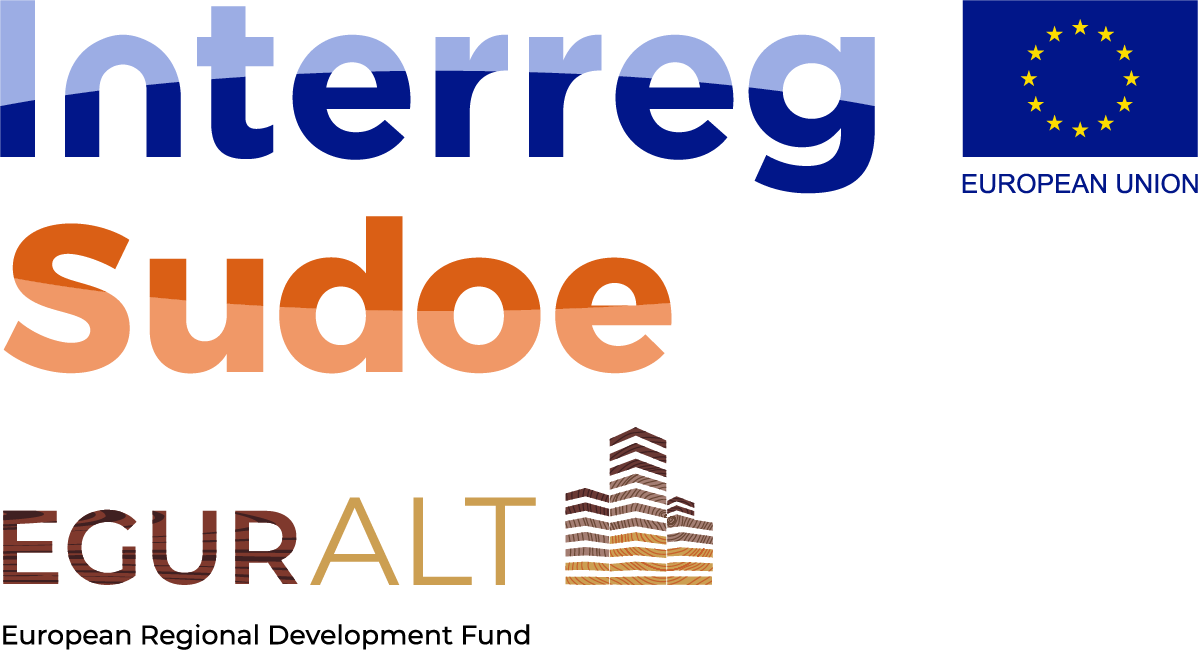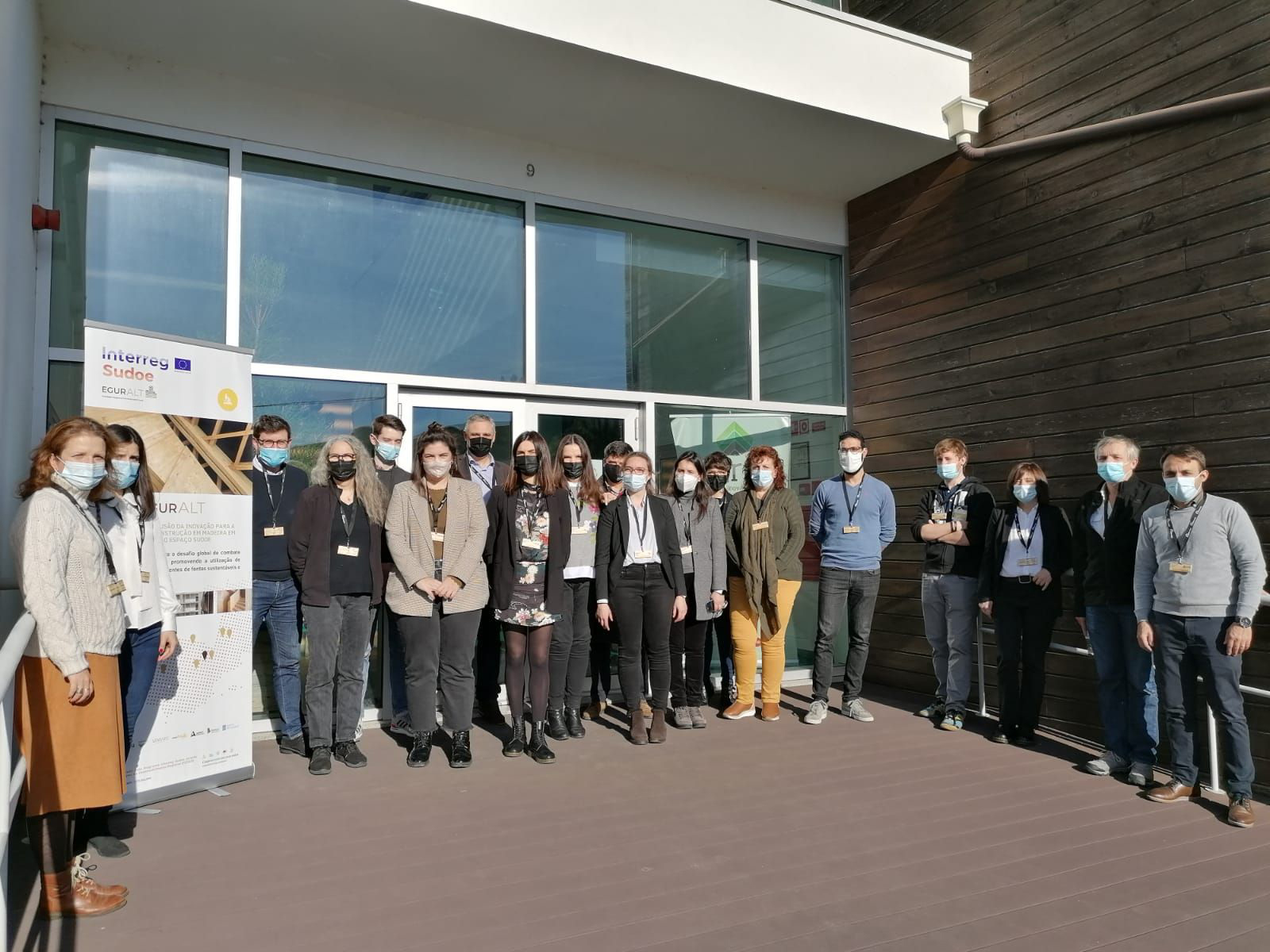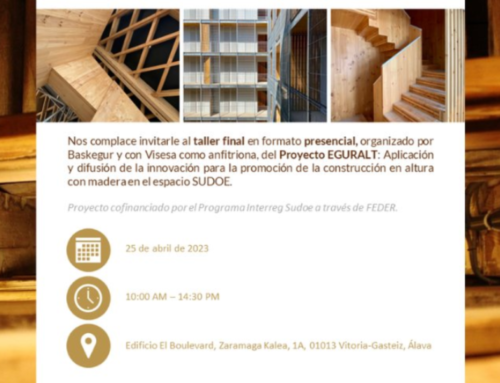The Centro de Inovação e Competências da Floresta (SerQ) hosted on December 16 and 17 the third steering committee of the Interreg Sudoe Eguralt Project, which brought together about twenty people from France and Spain.
The Interreg Sudoe Eguralt Project held its third steering committee at the facilities of the Centro de Inovação e Competências da Floerasta (SerQ), in Sertã. About twenty professionals and experts on timber construction travelled to the Portuguese city to discuss the latest developments of a project, EGURALT, which aims at the implementation and dissemination of innovative solutions for the promotion of mid-rise timber construction in the Sudoe area.
 The Steering Committee was held on December 16 and 17 and included technical meetings of the different working groups that make up the project. In addition, three study visits were made to SerQ’s facilities, to the University of Coimbra and to the Hotel Mondego in the same city.
The Steering Committee was held on December 16 and 17 and included technical meetings of the different working groups that make up the project. In addition, three study visits were made to SerQ’s facilities, to the University of Coimbra and to the Hotel Mondego in the same city.
On December 16, the Steering Committee met to learn about the status, needs and next steps of the project. During the afternoon of the same day, the technical meetings were held. During Working Group 1, which deals with “diagnosis, knowledge exchange and study of opportunities”, the priorities detected, the conclusions of the last Workshop and the progress of the activities and deliverables of this activity were presented.
Once this first technical meeting was concluded, SerQ members took the other partners on a tour of their facilities. This visit included the test room, where strength tests were conducted with two glulam beams made from hardwood species.
Friday began with a presentation of progress in Working Group 2, which consists of “experimenting with new processes, products and technologies for optimizing the use of wood in construction”. At this point, the partners shared the results obtained from their experiments and pilot tests. Friday morning ended with Working Group 3: “Dissemination, capitalization of knowledge and awareness-raising for the paradigm shift towards sustainable construction using wood”, where different options for creating trainings were discussed, as well as the various possibilities for forging international partnerships.
Study Visits
After the end of the technical meetings, the Eguralt partnership travelled to the city of Coimbra, where in the afternoon they visited both the University and the Hotel Mondego, where the engineer Luís Jorge, from TISEM Lda (project partner), gave a brief presentation of the building rehabilitation project, specifically the use of cross-laminated timber (CLT) in the building. It should be noted that the Hotel Mondego building will be part of the guide for mid-rise timber construction that the consortium is developing within the framework of Working Group 1.
EGURALT, which is part of the Interreg SUDOE Program, is 75% co-financed by the European Regional Development Fund (ERDF) and has a total budget of 1,011,562.50 euros.
Maitane Zazu, head of the Special Projects Section of Nasuvinsa, presented the experimentation activity in the promotion of social housing and announced that the kick-off meeting will be held in January 2022.
Iván Bermejo, Technician and Head of Management of ADEMAN, took the floor to present his experiment on wooden floors with local species.
Vanesa Baño, head of research on wood structures at Cesefor, commented on the progress of her analysis of the state of the art of wood construction at height in the Sudoe area, a report that will soon be available through the project. In addition, the partners were able to see a sample of the technical sheets, which, likewise, will be available soon and which already have a brief summary through an interactive map available on Eguralt’s website.
Aitor Sáez, Baskegur presented the priorities found by the different working groups: promotion and public policies; training, sectorial business strategy and R+D+i.
Aline Barlet, Co-Director of GRECCAU, presented the interdisciplinary training module on wood construction at height, which will have 4 levels: awareness, initiation, deepening and experience. ENSAP Bordeaux is also a partner in two other working groups. On the one hand, they are responsible for the status of the survey on the perception of wood construction in the SUDOE area, associated with the Working Group “Diagnosis, exchange of knowledge and study of opportunities”. On the other hand, they collaborate in the Working Group 2 “Experimentation of new processes, products and technologies for the optimization of the use of wood in construction”, where Ryad Bouzouidja and Denis Bureau, presented the pilot “Passive or semi-active thermal mass in the envelopes of buildings with timber structure”.
Apolline Oswald, Chef de projet Bois Matériau of Xylofutur, explained the different options that are being considered for collaborations and alliances with International Networks on Medium-Rise Timber Construction.
The Axencia Galega da Industria Forestal, which leads the working group 3 “Dissemination, capitalization of knowledge and awareness for the paradigm shift towards sustainable construction using wood”, presented, through the technician Manuel Touza, the progress made in recent months in this field. In addition, XERA collaborates in Working Group 2 “Experimentation of new processes, products and technologies for the optimization of the use of wood in construction”, where Azahara Soilán, technician of the Axencia presented the pilot test “Solutions to improve durability against subterranean termites and reaction to fire in CLT panels”.
Carlos Martins from SerQ explained the first experiment of the pre-industrialization processes, focused on the study of concrete panels with local species (CLT) and presented Pilot 1 – Glued laminated timber from local hardwoods. It is part of Activity 2.3.




